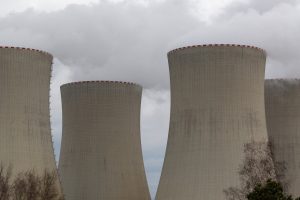Last week, amid a visit to Uzbekistan, Russian Prime Minister Mikhail Mishustin reportedly described their cooperation in the nuclear energy realm as “important” and cited the planned joint construction of a Russian-designed nuclear power plant in Uzbekistan.
“It is necessary to speed up the implementation of the agreements reached,” the Russian prime minister said.
Back in 2018, Uzbekistan and Russia hammered out an agreement under which the two would cooperate on the construction of two nuclear reactors in Uzbekistan. Although Uzbekistan is ranked the world’s seventh largest uranium supplier, the country does not have any operating nuclear power plants. With energy a top concern for Central Asia’s most populous state, Tashkent has pledged to bring nuclear power into its energy mix.
The two sides started with an initial shortlist of 10 sites in Uzbekistan. In May 2019, Rosatom — the Russian state nuclear corporation — announced that a site had been selected near Aydarkul Lake in the Jizzakh region and construction would begin in 2020 or 2021. A few months later, the site was seemingly shifted to a nearby location close to Lake Tuzkan, in Jizzakh’s Farishsky district. Reports in the summer of 2019 quoted Uzbek officials referring to plans for four units, rather than two.
At the time of the initial 2018 agreement, the price tag was typically cited as between $10-11 billion, with the Uzbek side — the state-owned energy company, Uzbekenergo — estimating the cost at $10 billion and Rosatom using the higher figure. Rosatom also said that the financing would come mostly from a Russian loan.
Rosatom CEO Alexey Likhachev said in October 2019 that the corporation would sign the main contracts for the plant construction with Uzbekistan by the year’s end. That didn’t happen. Over the next two years, the two sides continued discussions, but no progress was made and little information about the project was released.
As with all nuclear power plant projects, there are myriad concerns related to cost efficiency, safety, nuclear waste, and environmental concerns. As Timur Idrisov wrote for the Third Pole last year, the initially planned two-reactor nuclear power plant was envisioned as providing a total capacity of 2.4 GW. Even doubling that to 4.8 GW the pursuit of nuclear energy appears laughably expensive when Tashkent anticipates electricity demands as high as 400 GW by 2050.
But as researcher Margarita Kalinina-Pohl, of the James Martin Center for Nonproliferation Studies (CNS), told Voices on Central Asia in 2020, beyond the official narrative depicting the nuclear power plant construction as an economic and environmental pursuit, “For many nations, having nuclear technologies is a matter of prestige. It shows that they belong to the ‘elite club’ – a country with advanced technologies.” Neighboring Kazakhstan is pursuing its own nuclear power plant project.
Skip ahead two years — past a pandemic that would have likely delayed construction if a lack of agreement on the details hadn’t already done that — and new roadblocks have appeared.
The World Nuclear Association in late 2021 cited the cost as $13 billion. In June, Uzbekistan’s Deputy Minister of Energy Sherzod Khodjaev met with journalists to discuss the project, noting Uzbek desires to “optimize the cost.” According to a report originally from Gazeta.uz, he said, “The site is selected, the station technology is selected, and there is a cost that comes from the process of adapting this technology to this site. We don’t have a price agreement yet. Because in our opinion it is very expensive. It is necessary to optimize the cost of the project.”
The next month Rosatom and Uzbekistan signed a memorandum of understanding (MoU) on nuclear infrastructure development, in particular training for teachers, technical tours of Russian nuclear power plants, and “participation of Uzbek specialists in the joint activities of Rosatom Technical Academy and the International Atomic Energy Agency (IAEA).” Even as the MoU suggests continued collaboration, it doesn’t indicate a solution to the price question.
Beyond (and perhaps influencing) the financial questions are the difficulties generated by Russia’s invasion of Ukraine. Rosatom has yet to be sanctioned, but as the war in Ukraine approaches its 11th month, that may not hold true in perpetuity. Even if Rosatom remains unsanctioned, sanctions may still generate difficulties when it comes to financial transitions, related technologies and more.
It’s clear Uzbekistan has reasons to pump the brakes, even if Tashkent isn’t keen on dumping the project entirely — and Russia has both economic and political reasons for wanting the project to finally get underway. The question is whether Tashkent can wait out the risks of sanctions (i.e. wait for the Ukraine war to end), and if Moscow will be patient.
Uzbek President Shavkat Mirziyoyev cited 2028 as the goal for the nuclear power plant to be completed when the first agreements were signed in 2018. Tashkent hopefully envisions nuclear power as supporting 15 percent of the country’s electricity demands by 2030.

































